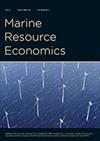Prospects for Small-Scale Aquaculture in Chile: User Rights and Locations
IF 1.7
3区 经济学
Q2 ECONOMICS
引用次数: 2
Abstract
Chile’s extended allocation of marine user rights aims to reduce overextraction of marine resources. New user rights promote small-scale aquaculture both to increase coastal incomes and to encourage fishers to transition to other livelihoods. Some activities prove profitable only in particular biogeographic settings, such as open ocean or estuaries. We examine a coastal region of Chile to investigate the response of households to these marine-based activities and rights. Because residents report a low propensity to move, we analyze the drivers of household activity choices conditioned on their biogeographic zone and user rights. In a second step, we find that variability in income across households is explained by household characteristics, the chosen economic activities, and geographical location. In policy experiments based on these regression results, we find that the adjustment to new policies presents challenges for inducing fishers to undertake small-scale aquaculture, without imposing short-run income losses.智利小型水产养殖的前景:用户权利和地点
智利扩大海洋使用权的分配旨在减少对海洋资源的过度开发。新的使用权促进了小型水产养殖,既增加了沿海地区的收入,又鼓励渔民转向其他生计。一些活动证明只有在特定的生物地理环境中才有利可图,例如公海或河口。我们调查了智利的一个沿海地区,以调查家庭对这些基于海洋的活动和权利的反应。由于居民的迁移倾向较低,我们分析了以他们的生物地理区域和用户权利为条件的家庭活动选择的驱动因素。在第二步中,我们发现不同家庭收入的差异可以通过家庭特征、所选择的经济活动和地理位置来解释。在基于这些回归结果的政策实验中,我们发现,对新政策的调整对诱导渔民在不造成短期收入损失的情况下进行小规模水产养殖提出了挑战。
本文章由计算机程序翻译,如有差异,请以英文原文为准。
求助全文
约1分钟内获得全文
求助全文
来源期刊

Marine Resource Economics
农林科学-渔业
CiteScore
4.30
自引率
10.30%
发文量
25
审稿时长
>12 weeks
期刊介绍:
Marine Resource Economics (MRE) publishes creative and scholarly economic analyses of a range of issues related to natural resource use in the global marine environment. The scope of the journal includes conceptual and empirical investigations aimed at addressing real-world oceans and coastal policy problems. Examples include studies of fisheries, aquaculture, seafood marketing and trade, marine biodiversity, marine and coastal recreation, marine pollution, offshore oil and gas, seabed mining, renewable ocean energy sources, marine transportation, coastal land use and climate adaptation, and management of estuaries and watersheds.
 求助内容:
求助内容: 应助结果提醒方式:
应助结果提醒方式:


